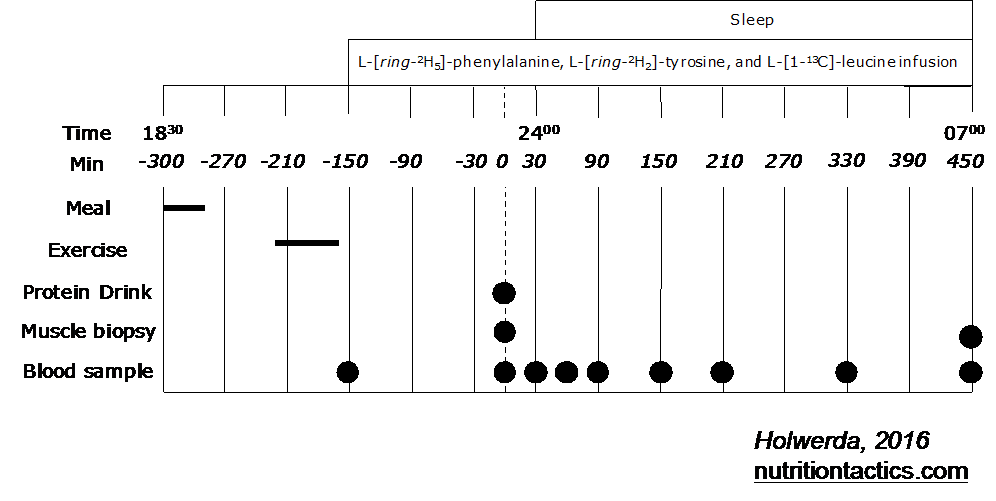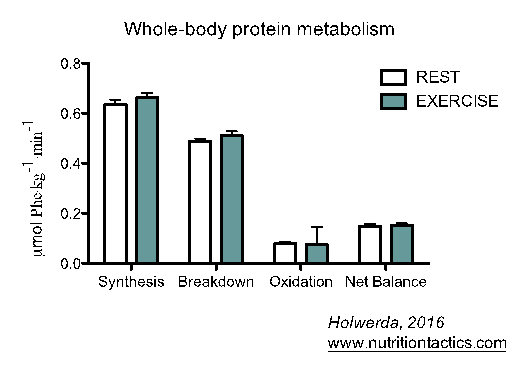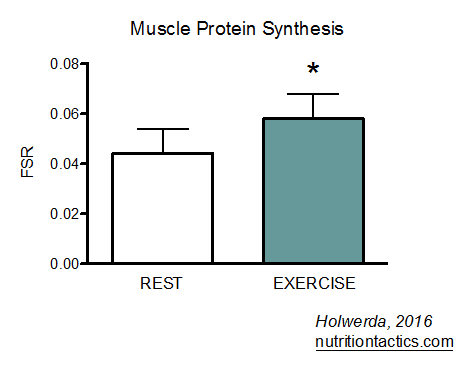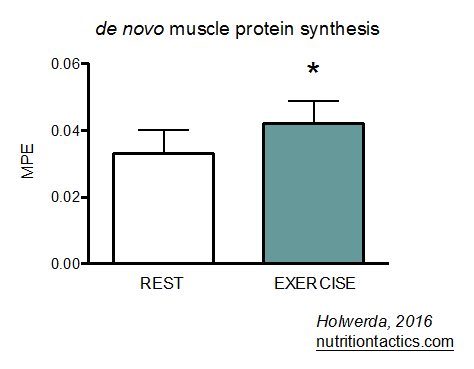By: This guest post is written by Jorn Trommelen.
tl;dr: Lifting during the day and eating protein before bed helps protein synthesis while you sleep, even when you are in your 70s!
As we get older, we start to lose muscle mass.
Older adults, usually defined as 65 years or older, have what we call ‘’anabolic resistance’’. This means that they respond less to anabolic stimuli such as resistance exercise and protein feeding compared. In fact, they seem to need double the amount of protein in a meal to optimally stimulate muscle protein synthesis (the process of building muscle).
However, appetite also decreases with increasing age, and it’s not that easy for a lot of elderly to eat large amounts of protein in each meal. Therefore, rather than eating more protein at the main meals, our lab has suggested that an additional protein meal before bed may be an effective and practical strategy to help compensate for anabolic resistance.
We have previously shown that protein is effectively digested and absorbed during sleep in elderly, and thereby stimulates muscle protein synthesis during overnight sleep.
In the present study, we investigated whether resistance exercise performed earlier during the day, makes the protein you ingest prior to sleep even more effective.
Participants
We recruited 23 healthy, older adults (71±1 y).
The study
The subject received standardized nutrition throughout the day, which provided 1.1 g/kg of protein.
The subjects were randomized into two groups:
1) The resistance exercise group
2) The control group
The exercise group performed a single bout of resistance exercise (6 sets leg press and 6 sets of leg extension) between 19:45 and 20:45, while the the control group did not.
Both groups received 40 g of casein protein immediately prior to sleep (23:30 h) and were woken up at 7:00 h.
The applied tracer infusion, repeated blood draws, and muscle biopsies before and after sleep, allowed us to measure overnight muscle protein synthesis (and more) in both groups.

The Results
Let’s first look at whole-body protein metabolism:

We see that overnight whole-body protein net balance was positive in both groups. This is expected, as both groups received protein prior to sleep.
Resistance exercise, however, had no effect on any measurement of whole-body protein metabolism. This is because resistance exercise is a very strong stimulus for the muscle, but it does not have an impact on other body proteins. Therefore, we also took muscle biopsies to investigate what was going on in the muscle.
As we expected, resistance exercise increased muscle protein synthesis during overnight sleep using the traditional methods of measuring muscle protein synthesis.
But here’s where we got fancy. We used highly enriched, intrinsically labeled protein. This means that amino acid tracers were built directly into the protein. This is an extremely expensive technique that only our lab uses. I’ll save you the methodological details, but the bottom line is that it gives you a more accurate measurement of muscle protein synthesis compared to when muscle protein synthesis is measured by only a tracer infusion. Editor’s note: This is super cool. Basically, imagine tagging a protein so you can tell precisely where it goes. Very cool method
Both methods showed very similar results: a ±30% higher overnight muscle protein synthesis rates when exercise was performed earlier in the day.

But we didn’t stop there. The use of intrinsically labeled protein also allowed us to measure how much of the protein drink was actually digested, taken up by the muscle, and build into actual muscle fibers during sleeping period. We found that much more of the protein derived amino acids ended up into newly build muscle tissue. This is called de novo muscle protein synthesis.

Practical Application
The first takeaway is that resistance exercise has no influence on overnight whole-body protein metabolism. But always keep in mind that whole-body protein metabolism doesn’t necessarily reflect what happens at the muscle.
We confirmed that resistance exercise increases the muscle protein synthetic response to pre-sleep protein ingestion in older adults using 3 different techniques. Therefore, we can have a lot of confidence in our results.
This study extends upon our previous findings that ingesting protein before bed increases overnight muscle protein synthesis, by showing that protein ingestion and resistance exercise performed earlier in the day work synergistically.
REFERENCE
Howlerda et al. Physical Activity Performed in the Evening Increases the Overnight Muscle Protein Synthetic Response to Presleep Protein Ingestion in Older Men. The Journal of Nutrition. 2016
Jorn Trommelen is PhD candidate in Muscle Metabolism. Read more articles on his blog Nutrition Tactics and follow him on Facebook

